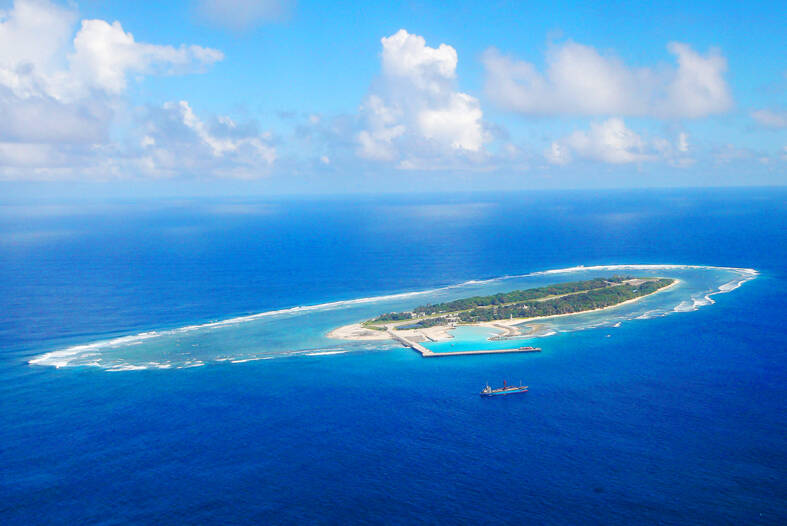Taipei on Friday rejected Hanoi’s characterization of its recent live-fire drill near Itu Aba Island (Taiping Island, 太平島) as “illegal,” saying that Taiwan’s claim to the small island in the South China Sea was “unquestionable.”
The Ministry of Foreign Affairs (MOFA) said in a statement that the comments made by its Vietnamese counterpart about the military’s routine live-fire drills near Itu Aba on Tuesday were “unacceptable.”
Earlier on Friday, Vietnamese Ministry of Foreign Affairs spokeswoman Le Thi Thu Hang called Taiwan’s military activity “a serious violation of Vietnam’s territorial sovereignty,” saying it had caused tensions and complicated the situation in the region.

Photo: Fabian Hamacher, Reuters
Hang said that Vietnam “resolutely opposes” Taiwan’s “illegal activities” while calling on Taipei to not repeat the drill.
Neither Taiwan nor Vietnam has given details about the live-fire exercise, including the type of weapons used.
MOFA said in its statement it was “unquestionable that Itu Aba is part of the Republic of China territory” and that the government had a right to exercise its sovereign powers on the island and its territorial waters.
Taiping, the largest of the naturally occurring Spratly Islands (Nansha Islands, 南沙群島), lies 1,600km southwest of Kaohsiung and is administered as part of the special municipality’s Cijin District (旗津).
The island is also claimed by Vietnam, China and the Philippines.
Taiwan administers control over the island, which is occupied by Taiwanese coast guard personnel trained by the Marine Corps, with drills regularly held there.

INVESTIGATION: The case is the latest instance of a DPP figure being implicated in an espionage network accused of allegedly leaking information to Chinese intelligence Democratic Progressive Party (DPP) member Ho Jen-chieh (何仁傑) was detained and held incommunicado yesterday on suspicion of spying for China during his tenure as assistant to then-minister of foreign affairs Joseph Wu (吳釗燮). The Taipei District Prosecutors’ Office said Ho was implicated during its investigation into alleged spying activities by former Presidential Office consultant Wu Shang-yu (吳尚雨). Prosecutors said there is reason to believe Ho breached the National Security Act (國家安全法) by leaking classified Ministry of Foreign Affairs information to Chinese intelligence. Following interrogation, prosecutors petitioned the Taipei District Court to detain Ho, citing concerns over potential collusion or tampering of evidence. The

‘FORM OF PROTEST’: The German Institute Taipei said it was ‘shocked’ to see Nazi symbolism used in connection with political aims as it condemned the incident Sung Chien-liang (宋建樑), who led efforts to recall Democratic Progressive Party (DPP) Legislator Lee Kun-cheng (李坤城), was released on bail of NT$80,000 yesterday amid an outcry over a Nazi armband he wore to questioning the night before. Sung arrived at the New Taipei City District Prosecutors’ Office for questioning in a recall petition forgery case on Tuesday night wearing a red armband bearing a swastika, carrying a copy of Adolf Hitler’s Mein Kampf and giving a Nazi salute. Sung left the building at 1:15am without the armband and apparently covering the book with a coat. This is a serious international scandal and Chinese

Seventy percent of middle and elementary schools now conduct English classes entirely in English, the Ministry of Education said, as it encourages schools nationwide to adopt this practice Minister of Education (MOE) Cheng Ying-yao (鄭英耀) is scheduled to present a report on the government’s bilingual education policy to the Legislative Yuan’s Education and Culture Committee today. The report would outline strategies aimed at expanding access to education, reducing regional disparities and improving talent cultivation. Implementation of bilingual education policies has varied across local governments, occasionally drawing public criticism. For example, some schools have required teachers of non-English subjects to pass English proficiency

TRADE: The premier pledged safeguards on ‘Made in Taiwan’ labeling, anti-dumping measures and stricter export controls to strengthen its position in trade talks Products labeled “made in Taiwan” must be genuinely made in Taiwan, Premier Cho Jung-tai (卓榮泰) said yesterday, vowing to enforce strict safeguards against “origin laundering” and initiate anti-dumping investigations to prevent China dumping its products in Taiwan. Cho made the remarks in a discussion session with representatives from industries in Kaohsiung. In response to the US government’s recent announcement of “reciprocal” tariffs on its trading partners, President William Lai (賴清德) and Cho last week began a series of consultations with industry leaders nationwide to gather feedback and address concerns. Taiwanese and US officials held a videoconference on Friday evening to discuss the